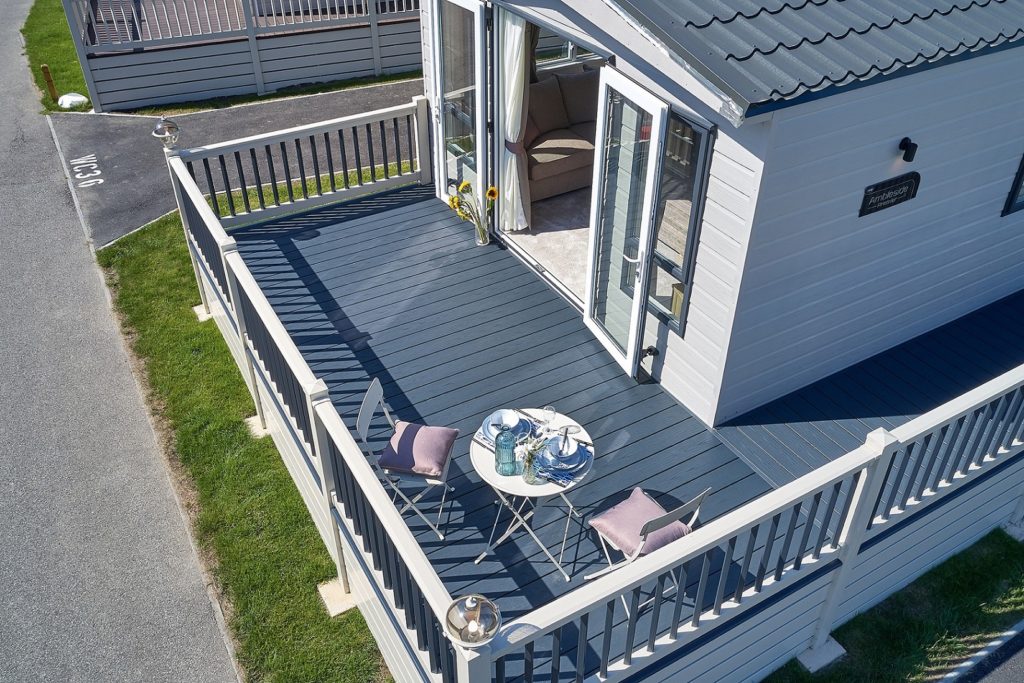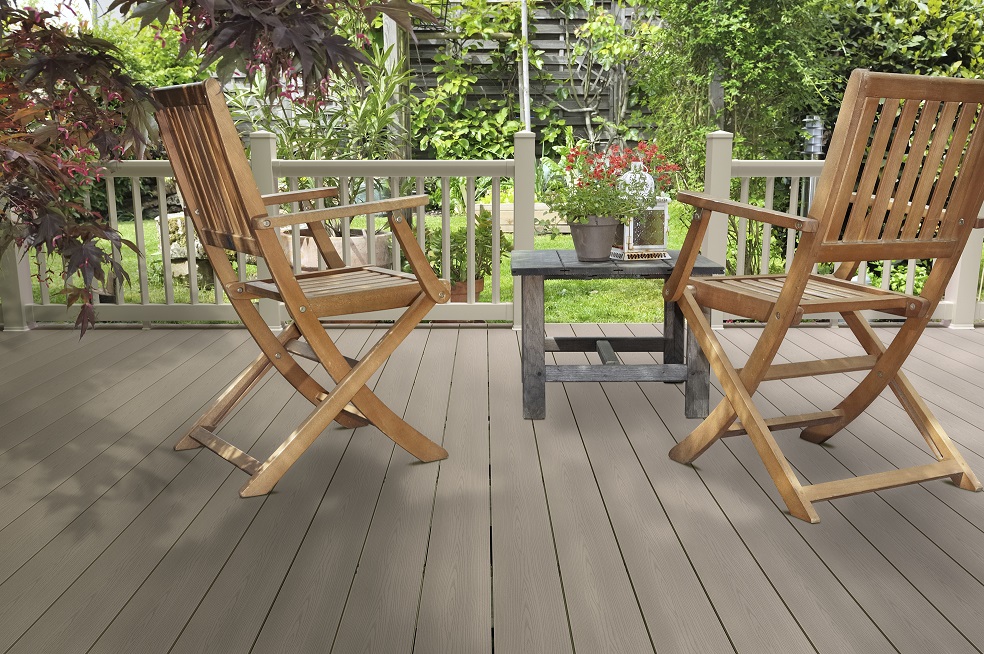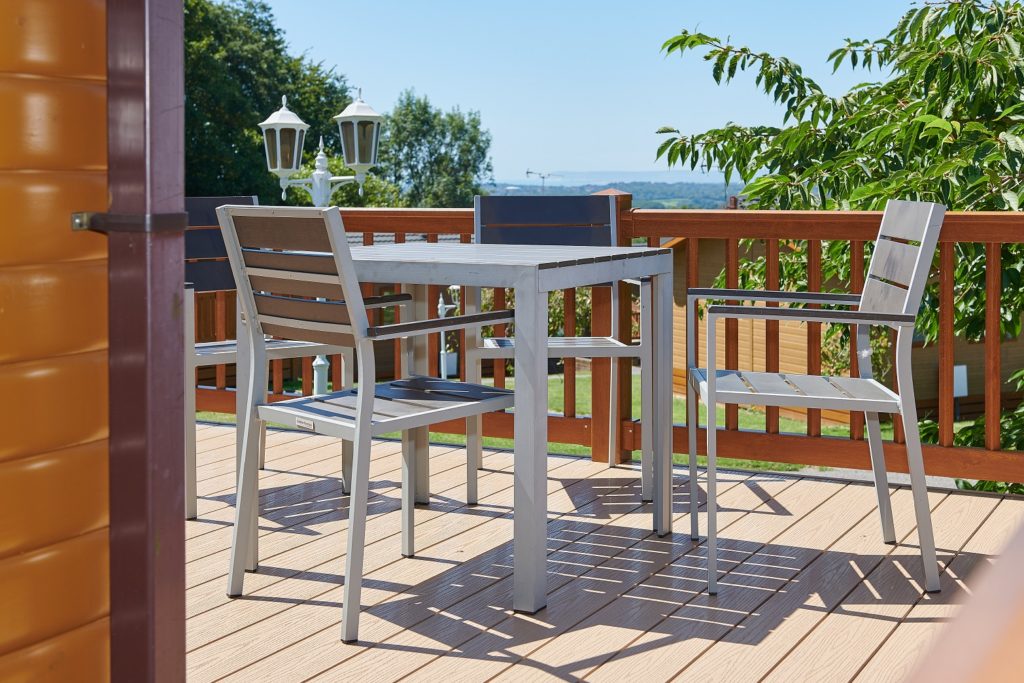Want to understand PVC-u decking better and weigh up the pros and cons?
Below, we have put together a range of frequently asked questions to help you explore DekBoard and our PVC-u products in more detail.
Have a question that isn't listed below? Get in touch:
CONTACT US
What are the advantages and disadvantages of PVCu decking?
PVCu decking may cost a bit more than a timber deck initially, and roughly the same as a middle of the road hollow/capped composite/WPC deck. However, PVCu decking will by far surpass timber and hollow and capped composite/WPC decking in terms of lifespan, safety, eco credentials and colour and texture retention.
What is DekBoard Plus?
Launched exclusively for the holiday home market in 2021, DekBoard Plus is our new wider 195mm board, with a unique contemporary visual appeal.
Dekboard Plus has all of the same great qualities as our standard DekBoard boards – the one difference is simply the width of the board. DekBoard Plus boards are 195mm wide, whereas our standard boards are 145mm wide.
DekBoard Plus is also available with our usual range of balustrade options and other accessories to beautifully complement your deck.
Does PVCu decking fade?
PVCu decking will retain its aesthetics for many years. Some composite/WPC decks, particularly uncapped versions may certainly change colour faster and more noticeably.
What is the best maintenance free decking?
PVCu or aluminium and some high end rubber faced decking will require the least maintenance, whereas wood will need to be treated annually and hollow composite/WPC may warp or split as a result of seasonal changes.
How do you install PVC-u decking?
Our PVCu decking is laid onto a frame and attached to bearers in the same way you’d lay a timber or composite/WPC deck, but it has clip fixings which show no visible fixings in the surface of the board. The clips are made from stainless steel and are very simple to use. This gives you a linear look and a smooth deck surface.

What is the difference between our Balustrade for Home and our Balustrade & Gate Kits?
Effectively, the two options are made with the same products but our Balustrade for Home offers provides you with a lot more bespoke options to suit the size and style of your decking area. These options include different colour options, the ability to cover different size areas, different balustrade configurations, glass options and more.
Our Balustrade & Gate Kits have been designed to offer you an out-of-the-box solution to your balustrade needs, allowing you to finish your decking area in the most simple manner. They are easy to install, low-maintenance and come with step-by-step installation instructions.
Visit the two pages to find out more:
Is PVCu decking slippery when it has rained?
Some wooden or composite/WPC decks can become very slippery when wet, but our PVCu decking is designed to encourage water removal. It has a clever textured surface which prevents the formation of pools or puddles of water by breaking water tension and allowing it to run off. It also has a gently domed face which also aids water run off. It also won’t attract mold or lichen, which can be one of the downfalls of timber and some composite/WPC decks.
What maintenance does PVCu decking need?
Maintenance and Aftercare
To keep your low maintenance DekBoard product in top condition, we recommend cleaning your decking & balustrade with hot soapy water at least twice a year.
Important Points:
- Ensure adequate ventilation underneath your decking. Keep area beneath your decking free from obstruction
- Ensure ventilation around the hot tub of a 25mm gap is free from obstruction
- Jet washers on a low pressure setting can be used for the decking boards only
- DO NOT USE JET WASHERS ON FOILED BALUSTRADE.
Cleaning & Care
- Clean your balustrade with a cleaning solution of warm soapy water using a cloth or sponge
- Clean your decking with a cleaning solution of warm soapy water using a cloth, sponge or soft bristle brush
- DO NOT place ANY hot surfaces or use BBQs in the vicinity of the decking
- DO NOT use any glass/PVC cleaning products or any forms of bleach or solvent
- DO NOT scrub your decking or balustrade with any abrasive products, such as scourers, sandpaper, stiff or wire brushes etc.
Additional tips:
- Some brands of sun cream can permanently stain foiled balustrade finishes
- DO NOT place rubber mats or rubber backed mats anywhere on the decking area.
Please note, to ensure warranty remains intact please ensure above Maintenance and Aftercare Guide lines are adhered to.
Which is better; PVCu or composite/WPC decking?
There has been a big push on composite/WPC decking over the last few years but even after a year or two of being fitted, some composite/WPC decks are starting to look a bit tired because the boards can warp, split or fade and the surface coating and texture may also wear away. PVCu will keep its appearance for many years, retaining its colour, strength, shape and textured surface which offers excellent slip resistance.
What applications are PVCu decking good for?
As long as the correct sub frame and bearer spacing is used, you can use PVCu for most ground and 1st storey levels. This includes garden decks, caravan verandas, balconies, access ramps, outdoor commercial areas, jetties and pool and hot tub surrounds.

Is PVCu decking expensive?
PVCu, over its lifetime is extremely economical and should be seen as a long term investment. A timber deck may be cheaper in the outset, but requires yearly maintenance (miss one and you may have to replace your entire deck). PVCu is no more expensive than some composite/WPC decks.
Does PVCu decking warp like timber?
PVCu decking will not warp or twist. Wood decking can warp and twists when it absorbs water and dries, and also when absorbed water freezes and unfreezes. PVCu decking does not contain any wood polymers so cannot absorb moisture and will retain its shape for years.
Is PVCu decking stronger than wood?
Both have their merits. PVCu will retain its strength without any annual maintenance. Timber decking however is a natural material and when left untreated can become porous which can make way for splitting, warping, mould and rot, which ultimately weakens it.
Is PVCu decking bad for the environment?
Quite the opposite. PVCu decking is much better for the environment than timber decking or some composite/WPC decking. Our entire decking system is 100% recyclable at the end of its life, and is made with an element of recycled materials in its manufacture. Timber decking on the other hand, in its natural form is extremely environmentally friendly, requires annual painting or varnishing, both of which are potentially toxic to the environment and means that treated timber decking can’t be recycled at the end of its life and can only be disposed of in landfill where the paint and varnish treatments can potentially harm the environment.

Is PVCu decking any good?
PVCu decking is probably the most environmentally friendly option when compared to alternatives such as timber or composite/WPC because it can be recycled at the end of its life. It is also excellent quality, long lasting and reliable alternative which keeps its colour and wood texture appearance for many years.
Is PVCu decking noisy?
When laid correctly, PVCu decking should not make any more noise than a timber or composite/WPC deck. Ensuring you have sufficient air gaps is key to a noise free deck.
How long does PVCu decking last?
PVCu decking is designed to last for years and only requires a hose or brush down to keep it looking new. PVCu decking is favourable to anyone wanting a low maintenance outdoor space.
